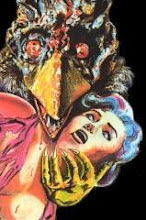Again though, there was a pronounced irritated tone throughout the book. I really don't know why: perhaps this was seen as humorous or this was how people behaved. Alice is bratty in this book, which makes sense considering she's only seven, but she's rather rude. She has a sense of entitlement and looks down on the creatures that reside through the looking glass. I understand they are silly at moments, but she doesn't alter her human sense of logic and just relish in the whimsy of Wonderland. The connotation of the book is best demonstrated by how many times Carroll uses the word "contempt" or its variants thereof.
The narrative wasn't as disjointed or disconnected as in the first book, and the story always returned to the the life-size chess match Alice was a part of. A cast of characters as unique as the first set showed up, and the Hatter returns as a page for the White Queen's court. My favorite part was with Humpty Dumpty, as he was wonderfully conceited. Characters were again altered or combined for the movie, and some memorable lines assigned to Alice and other characters.
The book's theme was about dreaming, to convey the transience of childhood. After Alice is unable to reach the scented rushes that constantly move out of reach (as illusive as recovering one's youth), Carroll writes "Even real scented rushes, you know, last only a very little white--and these, being dream-rushes, melted away almost like snow," on page 212. The book ends asking "which one do you think it was?" after discussing the dreams of Alice and the Red King.
Maybe I love the movie too much, or the disjointed narrative and contemptuous/irritated tone of the book is disconcerting, but the film was so much more magical and warm than the books.





No comments:
Post a Comment